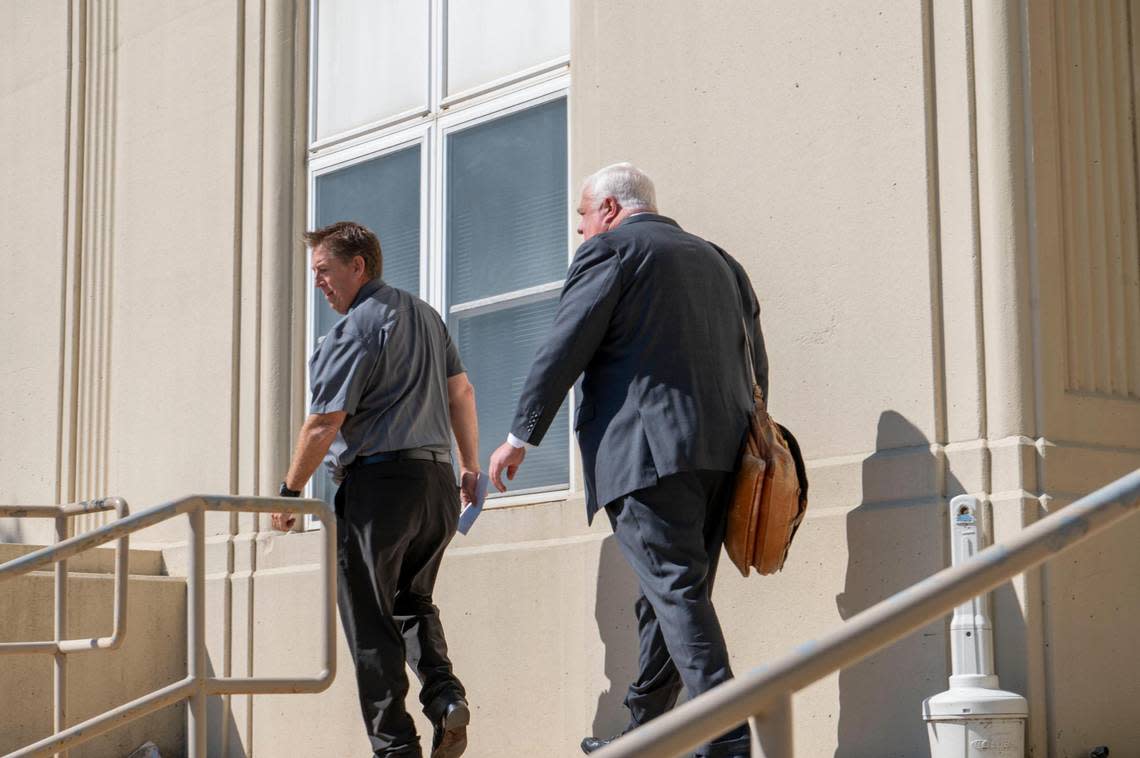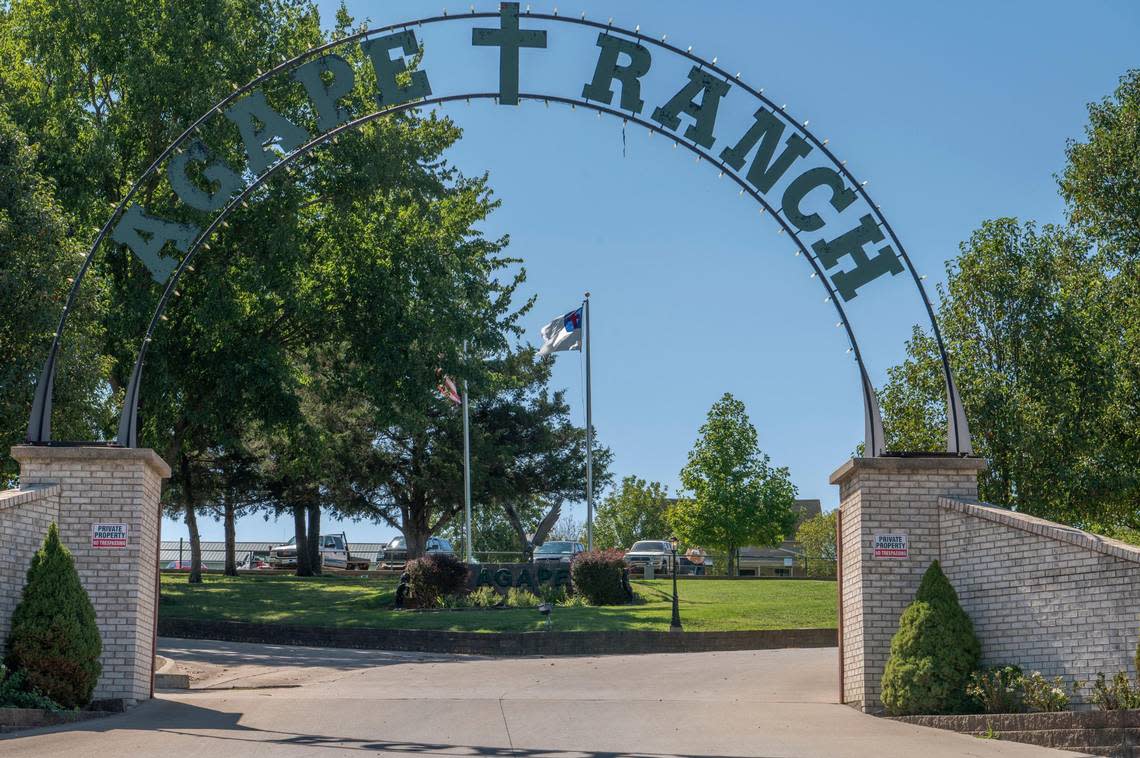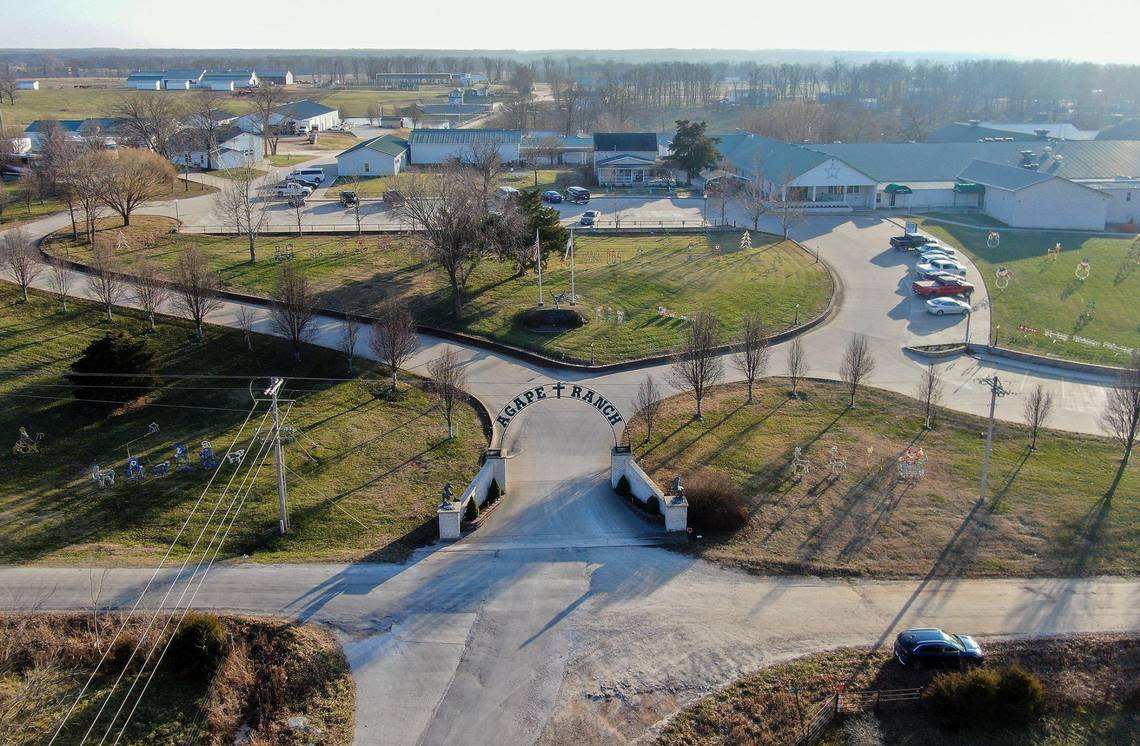Missouri judge again delays decision on Agape Boarding School as more abuse alleged
Abuse allegations against Agape Boarding School continue to intensify as a southwest Missouri judge again delayed a decision on whether it should close.
After 14 court motions filed in two days and legal wranglings inside a Cedar County courtroom Wednesday, the saga — being watched closely by child welfare advocates, Missouri lawmakers and former Agape students — will carry on until at least Monday.
That’s when Judge David Munton scheduled another hearing on a petition the Missouri Attorney General filed two weeks ago saying that the safety of the boys at the unlicensed school near Stockton was in jeopardy and the facility should immediately close. The AG’s office filed that petition along with the Missouri Department of Social Services, which has substantiated 11 reports of abuse at the school since May.
The delay Wednesday, in a case that has been riddled with them, no doubt frustrated many who say the 50 or so boys inside the school are in danger. Especially, they say, after a motion Monday in which the AG’s office detailed abuse allegations from nearly a dozen current students who secretly approached DSS workers who have been stationed inside the school since Sept. 8.
“Any person with a sane, unbiased mind looking into this case can see this judge is not making decisions on what’s best for the children involved,” said James Griffey, who attended Agape from 1998 to 2001.
Griffey, of southern California, testified at a legislative hearing last year on a proposed bill that would give the state some oversight of schools like Agape. That bill passed and is the basis for the attorney general’s move to shut down the school.
“I don’t know what his motives are for the decisions he’s making,” Griffey said of the judge, “but it’s evident that making sure the children are safe isn’t it.”
The attorney general’s office again will have witnesses ready to testify Monday morning and evidence to present, which it was prepared to do Wednesday morning and on Sept. 12.
But on both occasions, Munton delayed the case from going forward.
Last week, the delay was to give Agape’s attorney John Schultz time to depose a former student — who lives in California — who the AG’s office planned to call as a witness. And on Wednesday, Schultz said he needed time to appeal Munton’s rulings that denied his motion for a jury trial and his argument that the AG’s office doesn’t have legal standing in the case.

Immediately after the hearing Wednesday, Schultz said he planned to file his appeal by the end of the day or Thursday morning. He said if the case goes forward, Agape deserves a jury trial.
“They are trying to take property rights away and close the school down,” Schultz said. “It goes beyond what a traditional injunction involves.”
Attorneys with the AG’s Office and DSS officials left the courthouse before noon Wednesday to regroup and talk about Monday’s upcoming hearing.
“The Attorney General’s office has been steadfast in our fight to protect the students at Agape Boarding School,” said Chris Nuelle, press secretary for the AG’s office. “Today, the Attorney General’s Office yet again had witnesses, including victims of alleged abuse at Agape, ready to testify and the office was prepared to present evidence, but unfortunately the office was unable to do so.”
DSS workers will continue to be at the school 24/7 at least until Monday’s hearing.
Caitlin Whaley, DSS’ director of policy and communications, told The Star early Wednesday the child welfare agency has been actively engaged for years when it comes to unlicensed boarding schools.
“Missouri shouldn’t be a haven for child abuse,” Whaley said. “... We wouldn’t be taking this action if we didn’t think the kids are in danger.”
Many men who attended the school in their youth — spanning a period of three decades — have spoken with The Star over the past two years and said they were subjected to physical restraints, extreme workouts, long days of manual labor, and food and water withheld as punishment. They said students also suffered constant berating and mind games, and some were physically and sexually abused by staff and other youth.
New abuse allegations
Current students at Agape told Missouri child welfare workers in recent days about extensive ongoing abuse they said boys are enduring, according to a proposed petition included in a court motion filed Monday.
One boy was handcuffed for two weeks, students told the Children’s Division employees. Another ended up with his arm in a sling, students said, from an overzealous restraint. And yet another lost so much weight after being demoted to “Brown Town” — a designation given to the lowest level at Agape, where manual labor is required and meals are reduced — that he reportedly resorted to stealing food to keep from starving.

Those revelations were attached to Monday’s motion by the Attorney General’s Office in its efforts to shut down the school. Much of the information in the proposed amended petition came from interviews with nearly a dozen current students who approached Children’s Division employees while they were at the school monitoring for safety.
Munton on Wednesday denied the motion that would have allowed that amended petition to be filed.
After Munton scheduled another hearing for Monday, Justin Smith, chief of staff for the AG’s office, asked him to reconsider and take up the proposed amended petition at that time.
The judge rejected that.
On Sept. 7, Munton signed an order to immediately close Agape after the AG and DSS filed the initial petition saying the students there faced safety concerns. Child welfare officials had learned that a current staffer had just been placed on the Central Registry for child abuse and neglect, and state law doesn’t allow anyone with a substantiated report to work at a residential facility.
But the next morning, Munton put a hold on his order closing the school until he could confirm that the staffer was still there. He sent Cedar County Sheriff James “Jim Bob” McCrary to the school to find out, and Agape director Bryan Clemensen told McCrary that he had fired that staffer on Sept. 7 and the worker no longer lived on the school’s property.
Munton then scheduled a hearing for Sept. 12 on the petition to close the school and ordered that Children’s Division workers could stay on the Agape campus around the clock to ensure that students were safe.
At the Sept. 12 hearing, the AG’s Office called on a former student to testify. But Munton refused to let him because the teen left the school in July 2021. Munton said he needed to hear evidence of current abuse, not incidents from the past.
Another former student, who left Agape in July of this year, was to testify by video conference from California, but Schultz objected, saying he needed to depose the witness in person. Munton then continued the hearing to Wednesday to give Schultz time to go to California and take the former student’s deposition.
New bill filed in Jefferson City
As Wednesday’s hearing was underway, a Missouri lawmaker introduced a bill requiring all residential care facilities in the state to be licensed.
“The students have been left in a dangerous situation for weeks after Missouri filed a petition to remove the children from Agape,” Rep. Sarah Unsicker, D-Shrewsbury, told The Star. “Religion doesn’t give anyone a right to abuse children. Agape should have the same expectations for how they treat children as all other places that care for children in Missouri.”
Unsicker filed the measure as legislators are in Jefferson City for a special session called by Gov. Mike Parson to deal with state income tax cuts and agricultural issues.
“The horrifying and persistent allegations of endemic abuse, neglect, sexual assault and even trafficking of children that has happened at these boarding schools for decades starkly illustrates the state’s need to supervise these facilities to a greater extent,” Unsicker said in a news release. “Missouri is currently powerless to prevent these atrocities from happening until after they have occurred, but licensure would give the Department of Social Services more power to ensure children remain protected.”

Attempts have been made over the years to require such facilities to be licensed, but those efforts have failed, with critics calling the measures a violation of religious freedom. The new law passed last year requires residential care facilities to notify the state of their existence, conduct employee background checks and undergo health and safety inspections but does not require them to be licensed.
Under Unsicker’s proposal, the schools would have to apply for licensure, share information about their corporate structure and keep personnel records.
“Licensed facilities have to report dangerous incidents, such as death or serious injuries of a child, any conditions affecting the health and safety of a child for a period of longer than twelve hours, or any event that requires emergency responders,” Unsicker said.
If licensed, the schools can’t use cruel and unusual punishment or excessive or inappropriate work as disciplinary tactics or allow one child to discipline another. They also are prohibited from using handcuffs, physical or emotional abuse or requiring students to remain silent for long periods.
In addition, licensed residential facilities must provide an educational program that is appropriate to the child’s needs, Unsicker said, and educators are required to meet certification criteria established by the Department of Education. Licensed facilities also have standards for their buildings and grounds.
“For far too long, bad actors have taken advantage of our lax licensure laws to commit horrible crimes against vulnerable children,” she said. “If that’s not reason enough to change these laws, I don’t know what is.”
